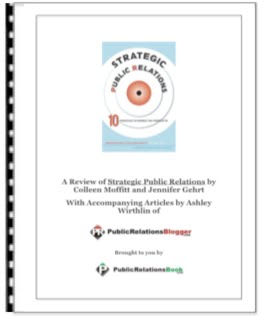________________________________________________________________________
 There’s good news for public relations execs, marketing
There’s good news for public relations execs, marketing
professionals and even one-man-band entrepreneurs: journalists
are surfing your sites looking for news.
It’s true - while some PR people spend months trying to win over
cynical reporters in order to wrangle a company profile or CEO
interview (and get nowhere), an army of journalists are
proactively hunting for facts, figures and interview candidates.
Now the bad news: these same journalists say most online press
rooms suck. Big time. If you’re thinking to yourself: ‘Uh-oh, we
don’t have a press room,’ chances are you’re missing out on
important media opportunities. If you’re thinking: ‘What’s a
press room?’ you need to act fast.
In an ideal world, a press room is a vibrant, constantly updated
section of your corporate website including company
backgrounders, executive profiles, news releases (with a
comprehensive, searchable archive), media mailing list and -
perhaps most importantly - clear and concise contact information
if journalists need to get in touch.
Want to see a great press room? As usual, Google pulls it off by
keeping things nice and simple:
http://www.google.com/intl/en/press/index.html
If you haven’t got the time or resources to put together a
world-class press room like that, here are a couple of strategies
that can help you in the short-term. But keep in mind these are
suggested as temporary measures - an accessible, professional
press room is no longer a luxury for a company that considers
itself professional, it’s an absolute necessity.
• Blog It!
Sign up for a blog at one of the big free providers such as
Blogger (http://www.blogger.com). These services are template
based and you can have their standard layouts look and feel like
your own site in a jiffy. To be honest, even if you use the
standard template, change the title and give it the odd tweak
here and there you’ve still covered the important bases.
Then place a link on your corporate website to the new blog
(perhaps label it as ‘News Blog’ or plain old ‘News Room’ or
‘Press Room’) and you’re ready to promote your news. Be sure to
include full contact details in the blog’s bio section -
remember, journalists are always on one deadline or another and
they want your input NOW! If you’re worried about spambots
gathering your email address, include them as ‘name <-at-> domain
dot com’. If a journalist can’t work that out you probably don’t
want to hear from them anyway!
Once your blog is up and running, turn it over to one or two key
members of your staff. Have them post news releases - and shorter
news updates - to the blog as often as possible. The beauty of
this solution is that you get free XML/RSS feeds thrown in via
the Blogger engine. If you don’t go for Blogger, be sure to check
on XML/RSS feeds before you select a suitable service.
• The Single-Click Press Room
Even if your corporate website is a few pages of plain HTML a
friend knocked together as a favour and you’re unwilling to make
any drastic changes to it in order to add a press room, you can
still provide visitors with a full list of your press releases
with the addition of a single link to your main site.
First of all, ensure you’re making full use of one of the free
press release distribution services. For the sake of this example
I hope nobody objects if I use our own, ClickPress
(http://www.clickpress.com).
Enter your company name in quotes as a search term - for
example: "Vegetarian Society". Hit search and you will be
presented with the results: press releases about or including
references to your company. Click on the link below for a live
example using "Vegetarian Society":
http://www.clickpress.com/cgi-bin/releases/search.cgi?query=%
22Vegetarian+Society%22
A search for “Your Company” will look something like this:
http://www.clickpress.com/cgi-bin/releases/search.cgi?query=%
22Your +Company%22
Copy that URL (with your own company’s name, of course) and there
you have it. Well, almost, you still need to add it to your site.
Add a link to the URL, label the link ‘Recent Press Releases’ and
every time you add a new press release to the news distribution
site it will be included in the dynamic search - you’ve got an
automatic, single-click press room.
• Contacts, Contacts, Contacts
Perhaps the most regular criticism made by web-savvy journalists
is a lack of media contact info on most corporate sites. If you
do nothing else to your site you should add a few lines
explaining who journalists should contact at your company and how
they should do it.
If you’re worried about spam, encrypt email addresses as
explained above or include them as a graphic rather than a hot
link. Provide a landline number and explain between what hours
someone will be available to take calls (and be sure to include
your time zone, unless you’re happy to field calls at three in
the morning from a journalist half way around the world).
There are a wealth of additional cost-free additions you could
make to your site to make it media friendly (a press release
mailing list hosted by Yahoo! Groups or Topica perhaps), so be
sure to check out what other companies are doing.
Best place to find them? In the results of a news search engine,
because they’re the ones who have probably secured media coverage
thanks to a proper press room.
Copyright © 2005 George Hopkin
George Hopkin is a freelance journalist and CEO of ClickPress, a free press release distribution service which distributes content to some of the world’s most influential news and web search engines. ClickPress is a propery of Pressventures, a provider of free and fee-based services to PR professionals.
Article Source.
Tags: online public relations, public relations, website content tips
Tips for Your Online Public Relations Pressence
________________________________________
 There’s good news for public relations execs, marketing
There’s good news for public relations execs, marketingprofessionals and even one-man-band entrepreneurs: journalists
are surfing your sites looking for news.
It’s true - while some PR people spend months trying to win over
cynical reporters in order to wrangle a company profile or CEO
interview (and get nowhere), an army of journalists are
proactively hunting for facts, figures and interview candidates.
Now the bad news: these same journalists say most online press
rooms suck. Big time. If you’re thinking to yourself: ‘Uh-oh, we
don’t have a press room,’ chances are you’re missing out on
important media opportunities. If you’re thinking: ‘What’s a
press room?’ you need to act fast.
In an ideal world, a press room is a vibrant, constantly updated
section of your corporate website including company
backgrounders, executive profiles, news releases (with a
comprehensive, searchable archive), media mailing list and -
perhaps most importantly - clear and concise contact information
if journalists need to get in touch.
Want to see a great press room? As usual, Google pulls it off by
keeping things nice and simple:
http://www.google.com/intl/en/press/index.html
If you haven’t got the time or resources to put together a
world-class press room like that, here are a couple of strategies
that can help you in the short-term. But keep in mind these are
suggested as temporary measures - an accessible, professional
press room is no longer a luxury for a company that considers
itself professional, it’s an absolute necessity.
• Blog It!
Sign up for a blog at one of the big free providers such as
Blogger (http://www.blogger.com). These services are template
based and you can have their standard layouts look and feel like
your own site in a jiffy. To be honest, even if you use the
standard template, change the title and give it the odd tweak
here and there you’ve still covered the important bases.
Then place a link on your corporate website to the new blog
(perhaps label it as ‘News Blog’ or plain old ‘News Room’ or
‘Press Room’) and you’re ready to promote your news. Be sure to
include full contact details in the blog’s bio section -
remember, journalists are always on one deadline or another and
they want your input NOW! If you’re worried about spambots
gathering your email address, include them as ‘name <-at-> domain
dot com’. If a journalist can’t work that out you probably don’t
want to hear from them anyway!
Once your blog is up and running, turn it over to one or two key
members of your staff. Have them post news releases - and shorter
news updates - to the blog as often as possible. The beauty of
this solution is that you get free XML/RSS feeds thrown in via
the Blogger engine. If you don’t go for Blogger, be sure to check
on XML/RSS feeds before you select a suitable service.
• The Single-Click Press Room
Even if your corporate website is a few pages of plain HTML a
friend knocked together as a favour and you’re unwilling to make
any drastic changes to it in order to add a press room, you can
still provide visitors with a full list of your press releases
with the addition of a single link to your main site.
First of all, ensure you’re making full use of one of the free
press release distribution services. For the sake of this example
I hope nobody objects if I use our own, ClickPress
(http://www.clickpress.com).
Enter your company name in quotes as a search term - for
example: "Vegetarian Society". Hit search and you will be
presented with the results: press releases about or including
references to your company. Click on the link below for a live
example using "Vegetarian Society":
http://www.clickpress.com/cgi-bin/releases/search.cgi?query=%
22Vegetarian+Society%22
A search for “Your Company” will look something like this:
http://www.clickpress.com/cgi-bin/releases/search.cgi?query=%
22Your +Company%22
Copy that URL (with your own company’s name, of course) and there
you have it. Well, almost, you still need to add it to your site.
Add a link to the URL, label the link ‘Recent Press Releases’ and
every time you add a new press release to the news distribution
site it will be included in the dynamic search - you’ve got an
automatic, single-click press room.
• Contacts, Contacts, Contacts
Perhaps the most regular criticism made by web-savvy journalists
is a lack of media contact info on most corporate sites. If you
do nothing else to your site you should add a few lines
explaining who journalists should contact at your company and how
they should do it.
If you’re worried about spam, encrypt email addresses as
explained above or include them as a graphic rather than a hot
link. Provide a landline number and explain between what hours
someone will be available to take calls (and be sure to include
your time zone, unless you’re happy to field calls at three in
the morning from a journalist half way around the world).
There are a wealth of additional cost-free additions you could
make to your site to make it media friendly (a press release
mailing list hosted by Yahoo! Groups or Topica perhaps), so be
sure to check out what other companies are doing.
Best place to find them? In the results of a news search engine,
because they’re the ones who have probably secured media coverage
thanks to a proper press room.
Copyright © 2005 George Hopkin
George Hopkin is a freelance journalist and CEO of ClickPress, a free press release distribution service which distributes content to some of the world’s most influential news and web search engines. ClickPress is a propery of Pressventures, a provider of free and fee-based services to PR professionals.
Article Source.
Tags: online public relations, public relations, website content tips
Popular choices
- Non Gamstop Casino
- Mejores Salas De Póker
- Casino Non Aams
- Non Gamstop Casinos
- Siti Casino Online Non Aams
- Migliori Siti Casino Online
- UK Online Casinos Not On Gamstop
- Meilleur Casino En Ligne Live
- Non Gamstop Casino Sites UK
- Non Gamstop Casino Sites UK
- UK Casino Not On Gamstop
- Casinos Not On Gamstop
- Online Casino
- オンラインカジノ
- UK Casino Not On Gamstop
- UK Casino Not On Gamstop
- Reputable Non Gamstop Casinos
- Casinos Not On Gamstop
- Best Non Gamstop Casinos
- Non Gamstop Casino
- Casinos Not On Gamstop
- Slots Not On Gamstop
- Non Gamstop Casino
- Casino Non Aams
- Casinos Not On Gamstop
- Betting Sites Not On Gamstop
- Casino Online Italia
- Casino En Ligne
- Casino En Ligne Belgique
- Siti Scommesse Bitcoin
- KYC 인증 없는 카지노
- Sites De Paris Sportif Fiables
- Casino En Ligne France
- Casino Non Aams Prelievo Immediato
- Meilleur Casino En Ligne Belgique
- Meilleur Casino En Ligne 2026
- Meilleur Casino En Ligne
- Casino En Ligne 2026
- Casino En Ligne France
Subscribe to:
Post Comments (Atom)






Comments (0)
Post a Comment